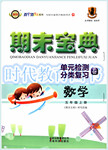
| |||||||||||||||||||||||||||||||||||||||||||||||||||||||||||||||||||||||||
 期末宝典单元检测分类复习卷系列答案
期末宝典单元检测分类复习卷系列答案科目:初中英语 来源: 题型:052
Reading comprehension. 阅读理解.
Judy works in a sports shop. She loves all kinds of sports. She can swim and skate very well. She often plays basketball and volleyball. These days, she is taking her tennis lessons at a tennis club (俱乐部). She goes to the club at weekends. There she meets Kate and Joan. The three of them become good friends. Kate and Joan started their tennis lessons earlier than Judy, but Judy learns the fastest. Now she plays the best of the three. She is going to take part in the tennis match next year.
True or False. 判断下列句子是否符合短文内容, 符合的用 “T” 表示, 不符合的用 “F” 表示, 填入括号内.
(1) Judy works at a tennis club.
( )
(2) Judy is Kate's new friend.
( )
(3) Judy starts her tennis lessons earliest of the three.
( )
(4) Judy can play tennis better than Kate and Joan.
( )
(5) Kate is going to take part in the tennis match next year.
( )
查看答案和解析>>
科目:初中英语 来源: 题型:050
阅读理解
A picture is on the wall. It's a picture of Mike's family. The man in the blue coat is Mr Smith. The woman is in a green coat. She is Mrs Smith. They have a son and a daughter. The boy in the yellow sweater is Mike. His sister is Joan. She is in a red sweater. Mike is my friend. We are in the same class. Joan is my friend, too. But she is in different classes.
根据短文内容判断正误:
(1)The picture on the wall is Mr Smith's family.
( )
(2)Mrs Smith isn't Joan's mother.
( )
(3)Mike is in a red coat.
( )
(4)Mike and Joan are my good friends.
( )
(5)Mike and Joan are in different classes.
( )
查看答案和解析>>
科目:初中英语 来源:人教新课标初三上册练习 人教新课标 题型:050
阅读理解
Most English people have three names: the first name, the middle name and the family name. Their family name comes last. For example, my full name is Jim Allan Green. Green is my family name. My parents gave me both of my other names.
People don't use their middle names very much. So “John Henry Brown” is usually called “John Brown ”. People never use Mr., Mrs. or Miss before their first names. So you can say John Brown, or Mr. Brown; but you should never say Mr. John. They use Mr., Mrs. or Miss with the family name but never with the first name.
Sometimes people ask me about my name. “When you were born why did your parents call you Jim?” they ask. “Why did they choose that name?” The answer is they didn't call me Jim. They called me James. James was the name of my grandfather. In England, people usually call me Jim for short. That's because it is shorter and easier than James.
(1) Most English people have ________ names.
[ ]
(2) ________ is Jim's family name.
[ ]
(3) English people use Mr., Mrs. or Miss with
[ ]
A. the family name
B. the first name
C. the middle name
D. the first name and the middle name
(4) The teacher's name is Mary Joan Shute. Her students call her
[ ]
(5) People usually call the writer Jim instead of James because
[ ]
A. it's the name of his grandfather
B. it's easier for people to call him
C. it's the name that his parents chose for him
D. it's more difficult than James
查看答案和解析>>
科目:初中英语 来源: 题型:050
阅读理解
Most English people have three names: the first name, the middle name and the family name. Their family name comes last. For example, my full name is Jim Allan Green. Green is my family name. My parents gave me both of my other names.
People don't use their middle names very much. So “John Henry Brown” is usually called “John Brown ”. People never use Mr., Mrs. or Miss before their first names. So you can say John Brown, or Mr. Brown; but you should never say Mr. John. They use Mr., Mrs. or Miss with the family name but never with the first name.
Sometimes people ask me about my name. “When you were born why did your parents call you Jim?” they ask. “Why did they choose that name?” The answer is they didn't call me Jim. They called me James. James was the name of my grandfather. In England, people usually call me Jim for short. That's because it is shorter and easier than James.
(1) Most English people have ________ names.
[ ]
(2) ________ is Jim's family name.
[ ]
(3) English people use Mr., Mrs. or Miss with
[ ]
A. the family name
B. the first name
C. the middle name
D. the first name and the middle name
(4) The teacher's name is Mary Joan Shute. Her students call her
[ ]
(5) People usually call the writer Jim instead of James because
[ ]
A. it's the name of his grandfather
B. it's easier for people to call him
C. it's the name that his parents chose for him
D. it's more difficult than James
查看答案和解析>>
湖北省互联网违法和不良信息举报平台 | 网上有害信息举报专区 | 电信诈骗举报专区 | 涉历史虚无主义有害信息举报专区 | 涉企侵权举报专区
违法和不良信息举报电话:027-86699610 举报邮箱:58377363@163.com